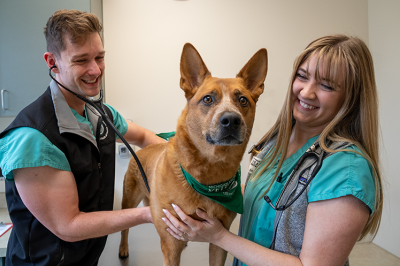
Proper nutrition plays a crucial role in both the prevention and management of various health conditions in pets. When a pet becomes ill, nutrition not only supports recovery but also aids in the management of chronic diseases, enhancing excede antibiotic for sale 100ml the effectiveness of medical treatments. As veterinary medicine advances, veterinarians increasingly emphasize the role of specialized diets and nutritional therapy to support overall health, manage symptoms, and even prevent certain illnesses. In this article, we explore the intersection of nutrition and veterinary medicine, discussing how feeding plays a vital role in health, recovery, and long-term well-being.
- The Role of Nutrition in Preventing Disease
Nutrition is foundational to preventing many health issues in pets. A well-balanced diet tailored to a pet’s species, age, breed, and lifestyle is essential for maintaining their overall health and reducing the risk of disease. For example, obesity is a common issue among pets and is often a precursor to more serious conditions such as diabetes, heart disease, and arthritis. By feeding a diet that is appropriate in calories and nutrients, pet owners can prevent these complications before they arise. Certain dietary components, such as antioxidants, omega-3 fatty acids, and vitamins, can also help support the immune system, reduce inflammation, and promote healthy skin, coat, and joints, contributing to overall well-being and disease prevention.
- Veterinary Prescription Diets: Targeted Nutrition for Specific Conditions
Veterinary medicine increasingly incorporates prescription diets as part of the treatment for various chronic illnesses. These diets are specifically formulated to address the unique nutritional needs of pets with conditions like kidney disease, diabetes, food allergies, and gastrointestinal disorders. For example, pets with chronic kidney disease are often prescribed low-protein, low-phosphorus diets to reduce the workload on the kidneys and slow disease progression. Similarly, diabetic pets benefit from diets that are high in protein and fiber but low in carbohydrates, which help stabilize blood sugar levels. Prescription diets are carefully balanced to provide the right nutrients while managing the symptoms of the disease, enhancing the effectiveness of veterinary treatments and improving the pet’s quality of life.
- Nutritional Support During Recovery from Surgery or Illness
When a pet is recovering from surgery, injury, or illness, proper nutrition is essential for promoting healing, maintaining strength, and preventing complications. During recovery, pets may have increased nutritional needs to support tissue repair, immune function, and energy levels. High-protein diets are often recommended for pets recovering from surgery or wounds, as protein plays a key role in tissue regeneration and wound healing. Additionally, pets recovering from gastrointestinal issues or pancreatitis may require easily digestible diets that are low in fat to avoid stressing the digestive system. In some cases, appetite stimulants or feeding tubes may be necessary for pets that are unable or unwilling to eat on their own. Ensuring that pets receive the right nutrients during recovery can speed up the healing process and prevent malnutrition or weight loss.
- Managing Obesity and Weight-Related Issues
Obesity is one of the most common nutritional problems in pets and is often associated with a range of health complications, including diabetes, joint problems, and heart disease. Managing a pet’s weight through proper nutrition is crucial for preventing these issues and improving overall health. Veterinary nutritionists can create weight management plans that include low-calorie, high-fiber diets to help pets lose weight while still feeling full and satisfied. Portion control, along with regular exercise, is also important in managing obesity. In addition to reducing the risk of chronic diseases, maintaining a healthy weight can improve a pet’s mobility, energy levels, and longevity. Pet owners should work closely with their veterinarians to determine the appropriate daily calorie intake and to monitor progress throughout the weight loss journey.
- Nutritional Supplements in Veterinary Medicine
In addition to standard diets, nutritional supplements are often used in veterinary medicine to provide targeted support for certain health conditions. Common supplements include omega-3 fatty acids, which are used to reduce inflammation in pets with arthritis or skin conditions, and glucosamine and chondroitin, which support joint health in aging pets. Probiotics are frequently recommended for pets with digestive issues, as they help restore healthy gut bacteria and improve digestion. Additionally, some pets may require vitamin or mineral supplements if they are deficient in specific nutrients. While supplements can be beneficial, it’s important for pet owners to consult with their veterinarian before adding any supplements to their pet’s diet, as improper use can lead to imbalances or negative interactions with medications.
- Tailoring Diets for Senior Pets and Special Needs
As pets age, their nutritional requirements change, and many senior pets develop health conditions that can be managed or mitigated with proper nutrition. For example, senior pets may require diets lower in calories to prevent weight gain but higher in certain nutrients like protein to maintain muscle mass. Additionally, pets with age-related conditions such as arthritis, cognitive decline, or kidney disease may benefit from specific dietary modifications or prescription diets designed to support their condition. Tailoring a pet’s diet to their life stage and health needs can help manage symptoms, slow disease progression, and improve their quality of life in their later years. Veterinarians play a key role in guiding pet owners on the best dietary choices for senior pets, ensuring they receive the right balance of nutrients to support healthy aging.
In conclusion, nutrition is a powerful tool in veterinary medicine that not only helps prevent disease but also plays a crucial role in managing chronic conditions, supporting recovery, and improving the overall health and longevity of pets. Whether through prescription diets, specialized feeding plans, or nutritional supplements, veterinarians can provide tailored nutritional guidance that complements medical treatments and promotes better outcomes for pets. By understanding the role of nutrition in pet health and working closely with their veterinarian, pet owners can ensure their pets receive the best care possible, both in sickness and in health.